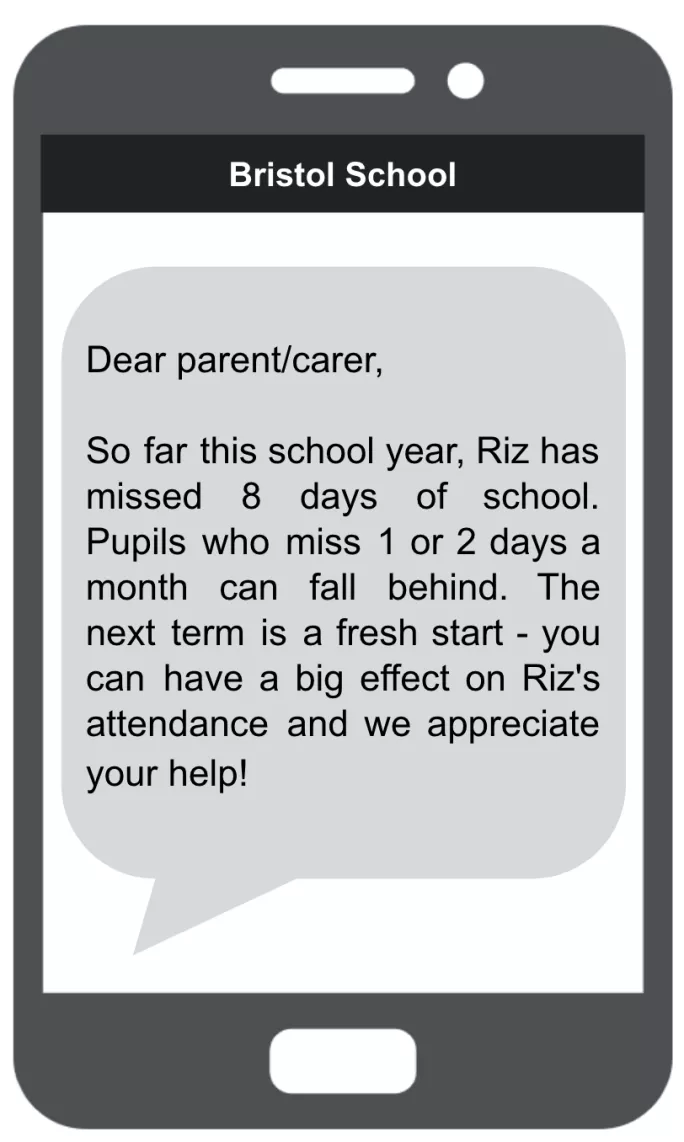Want to improve attendance? Give parents a nudge

Good school attendance is clearly vital for good student outcomes - after all, how can a child learn if they are not in school?
That is why in recent months there has been such a focus on attendance, with absence rates remaining higher than they were pre-pandemic.
The estimated absence rate (the proportion of sessions missed) for the 2022-23 academic year to date is 7.5 per cent, and persistent absence (the proportion of pupils missing 10 per cent or more of their possible sessions) doubled from 10.5 per cent before the pandemic in 2018-19 to 22.3 per cent in 2021-22.
Improving school attendance
The consequences of children missing school are significant. On average, students with higher absence over key stage 4 had lower GCSE attainment in 2019, and only 35.6 per cent of persistently absent students achieved the standard pass, compared with 67.6 per cent of all students.
As well as robustly predicting academic performance, absences also predict drug and alcohol use, criminality, and risk of later life adverse outcomes.
Therefore it is encouraging to see that a House of Commons committee has launched an inquiry to investigate attendance, with a primary goal of identifying the reasons for poor attendance and developing effective strategies to address them.
How nudge theory could help
One strategy that may be of interest to the committee and school leaders is the use of timely nudges to potentially improve school attendance - something that I have been involved in through my work with the Behavioural Insights Team (BIT).
Before the pandemic, we worked with Bristol City Council on a project exploring whether this approach could be effective.
A crucial part of the development of the intervention involved interviews with parents at local schools to better understand some of the barriers to good attendance.
While many of these barriers were structural in nature, and unlikely to be overcome with a nudge, it seemed that other obstacles could be tackled with a behavioural approach.
Using the right data and language
As an example of where a change in approach might be helpful, schools tend to express attendance as a percentage: this can be confusing and may not clearly signal a problem when one exists. In a school context “90 per cent attendance” can sound positive but actually it reflects around 15 days of school missed.
As well as drawing on what we heard from parents, we were inspired by research conducted by Todd Rogers and Avi Feller in the United States. Rogers is professor of public policy at the Harvard Kennedy School of Government, and co-founded EveryDay Labs, which partners with school districts in the US to reduce student absenteeism.
In their study, Rogers and Feller found that sending letters to parents telling them how many days of school their child had missed, while stating the importance of school attendance and their ability to influence it, reduced chronic absenteeism (missing 18 or more days of school) by over 10 per cent.
Drawing on this evidence, we developed a series of messages for parents that made it clearer how much education their child had missed in terms of days and why this mattered, such as the following:

We then set up a randomised controlled trial (RCT) involving over 9,000 students across 22 participating schools in Bristol.
Parents in the treatment group received a message (like the one above) if their child’s attendance was below 95 per cent over the course of a half-term. This allowed the intervention to be dynamic and personalised, as well as giving students a fresh start each half-term.
Although the trial was cut short by the start of the pandemic, exploratory analysis revealed that this approach boosted the proportion of students keeping good attendance records (attending 95 per cent or more of sessions) by roughly 4 percentage points (59.5 per cent to 63.3 per cent), and this result was statistically significant.
Overall, these findings suggest that simple text messages letting parents know how many days of school their child has missed, delivered at the right time, can make a difference to student attendance.
We estimate that if everyone in the trial had received the intervention, an extra 350 students would have achieved good attendance records compared with if everyone had been in the control condition.
How schools can get involved
With school attendance now even more of a challenge for schools across the country post-pandemic, we are delighted to be partnering with the Education Endowment Foundation and Youth Endowment Fund to take this work further and see whether timely nudges can work at scale to help improve school attendance in the current post-Covid context.
In total we are looking for 115 schools to participate in a RCT to determine whether this approach can help improve school attendance.
Schools interested in taking part in the project can book a call with the BITUP project team by clicking here or emailing BITUP@bi.team. More information on the project is available on the EEF website and the BITUP website.
The barriers to school attendance are complex and multifaceted, with many being structural issues that a message to parents will not help to overcome.
Our hope - informed by research from around the world and our own work in Bristol - is that timely nudges can be part of the solution to help improve school attendance.
If they are shown to work, timely nudges are a highly scalable, low-cost intervention that could help free up time for schools to focus on overcoming some of the more intensive and structural barriers to children achieving good attendance.
Lal Chadeesingh is principal adviser at the Behavioural Insights Team (BIT)
You need a Tes subscription to read this article
Subscribe now to read this article and get other subscriber-only content:
- Unlimited access to all Tes magazine content
- Exclusive subscriber-only stories
- Award-winning email newsletters
Already a subscriber? Log in
You need a subscription to read this article
Subscribe now to read this article and get other subscriber-only content, including:
- Unlimited access to all Tes magazine content
- Exclusive subscriber-only stories
- Award-winning email newsletters
topics in this article



